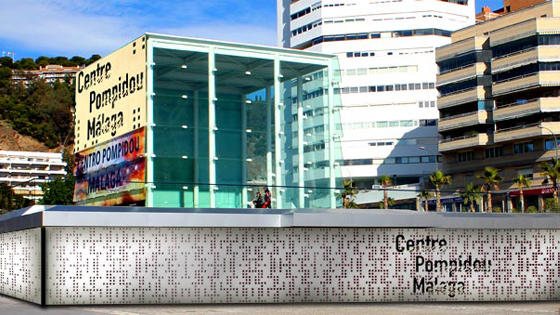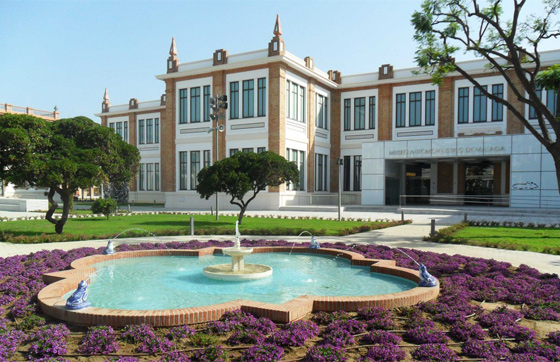
The 6,000m2 Centre Pompidou Málaga – close to the Muelle Uno shopping and leisure mall on the waterfront – expects to receive 250,000 visitors during its first year.
World-renowned for its Picasso Museum and the Centre of Contemporary Art (CAC), both of which opened their doors in 2003; followed in 2011 by the Carmen Thyssen Museum – focusing on 19th-century Spanish painting, with works from the Thyssen-Bornemisza collection – and the La Térmica in 2013, Málaga will be packing even more of a cultural punch with the eagerly awaited launch of not one, but two major new art attractions this week…
Today, Wednesday 25 March, is the inauguration of the Málaga satellite of the State Museum of Russian Art of St Petersburg… and just 72 hours later, it’s the turn of the famous Parisian Centre Pompidou. And with Málaga’s Easter Week celebrations – annually attracting thousands of visitors – almost upon us, the timing just couldn’t be better.
Initially operating for a period of 5 years, the Málaga branch of The Centre Pompidou – the first outside France – will be housed in the ‘El Cubo’ building, a landmark glass structure close to the city’s swish new Muelle Uno shopping and leisure mall on the waterfront. According to Spanish daily El Mundo, the 6,000m2 exhibition space will host a programme of temporary exhibitions, as well as showcasing works from the Parisian centre’s permanent collection, including some 90 pieces by Francis Bacon, Picasso, Joan Mirò, Chagall, Constantin Brancusi, Max Ernst, Frida Kahlo and René Magritte.
It’s estimated that at least 250,000 people will visit the Pompidou Málaga during its first year. Spanish PM, Mariano Rajoy and France’s Minister of Culture, Fleur Pellerin will preside over Saturday’s opening ceremony which will be attended by 1,000 guests.

The Málaga branch of the State Museum of Russian Art of St Petersburg occupies 7,000m2 of exhibition space in the historic Tabacalera building in the city’s Huelin district.
Meanwhile, on the western side of the city, the Málaga branch of the State Museum of Russian Art of St Petersburg is taking up residence – initially for the next 10 years – in the historic 'Tabacalera' building, where it will occupy 7,000m2 of exhibition space in two pavilions, alongside the much-visited Automobile Museum already installed there. While Vladimir Gusev – director of the State Museum of Russian Art of St Petersburg – will be attending today’s opening, it hasn’t yet been confirmed whether any other Russian dignitaries will be joining him.
The inauguration will feature two exhibitions: Russian Art from the 15th to 20th Centuries, and The Diaghilev Era. The former will run until November, while the latter – focusing on the founder of the Russian Ballet – will be showing until September.
These will be followed by an exhibition about another, perhaps less well-known figure from the Russian avant-garde movement, Pável Filonov. About whom Vladimir Gusev says, “Many believe that avant-garde is just about Kandinsky, Chagall, Malevich and Alexander Rodchenko, but actually it was a much more extensive period. I believe that Filonov is a somewhat complicated artist, but that there will be a great deal of interest in him in Spain.
“We are not only going to present the collections of the Russian Museum here, but works from private collections and other museums, too… we want this to become a Russian house, to create a bridge between Spain, the European Union and Russia”.
Reinventing itself for over a decade, these two latest additions to Málaga’s burgeoning art scene – not to mention its spectacular historic monuments, stunning cityscape, miles of sandy urban beaches, great shopping, and emerging fine food scene – haven’t gone unnoticed.
Not only recently featuring in the Telegraph’s Top 10 Cultural Holidays in Spain, but also chosen by The Guardian as one of the world’s 40 hot destinations for 2015 – as well as having recently been ranked as the 2nd top city to visit in 2015 after Johannesburg by the Rough Guides – it seems that the international media just can’t get enough of the fabulous capital of the Costa del Sol.
If you haven’t visited Málaga city for a while, it’s high time to get reacquainted!
 en
en



 Vlaams-Nederlands
Vlaams-Nederlands
0 Comments
Leave a Comment
DISCLAIMER
The opinions and comments expressed by contributors to this Blog are theirs alone and do not necessarily reflect the views of VIVA Homes Under the Sun Ltd, any of its associated companies, or employees; nor is VIVA to be held responsible or accountable for the accuracy of any of the information supplied.
Have you got something to say?